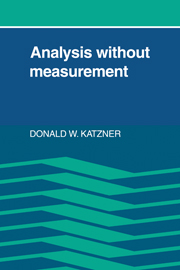Book contents
- Frontmatter
- Contents
- Preface
- Dedication
- 1 Introduction
- 2 Notes on measurement
- Part I Theoretical methods
- 3 Basic concepts
- 4 Algebraic structure
- 5 Analysis of specific systems
- 6 General systems
- 7 Some epistemological considerations
- Part II Applications to theoretical problems
- Part III Empirical verification
- Index
- Frontmatter
- Contents
- Preface
- Dedication
- 1 Introduction
- 2 Notes on measurement
- Part I Theoretical methods
- 3 Basic concepts
- 4 Algebraic structure
- 5 Analysis of specific systems
- 6 General systems
- 7 Some epistemological considerations
- Part II Applications to theoretical problems
- Part III Empirical verification
- Index
Summary
In much the same way as ordinary investigation of quantifiable experience rests on concepts such as set, relation, function, topology, and a multitude of others, so techniques for handling nonquantifiable phenomena may be built upon a similar foundation. To avoid confusion later, it is well to begin by specifying these fundamentals. The following discussion presents a brief outline of the basic set-theoretic and topological concepts and propositions that are required for subsequent use. It also illustrates the fact that a good deal of mathematical analysis does not depend on an ability to measure. Proofs that are well known and readily available are not repeated. The material is based, for the most part, on Halmos and Kelley.
The results to be developed here have immediate application in social science. Consider, as one example, the dispute over whether the U.S. and Soviet economic systems are becoming more alike as time passes (see, e.g., Prybyla). Many factors involved in the argument do not appear capable of measurement. To resolve this issue one clearly must know what it means for two economies to “come together.” Provided general agreement can be reached concerning the relevant properties on which comparisons are to be based, Section 3.2 shows that a definition of closeness is indeed possible. This, then, furnishes a framework for probing the question of U.S.-Soviet similarity.
- Type
- Chapter
- Information
- Analysis Without Measurement , pp. 53 - 78Publisher: Cambridge University PressPrint publication year: 1983



